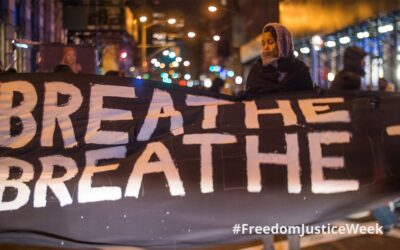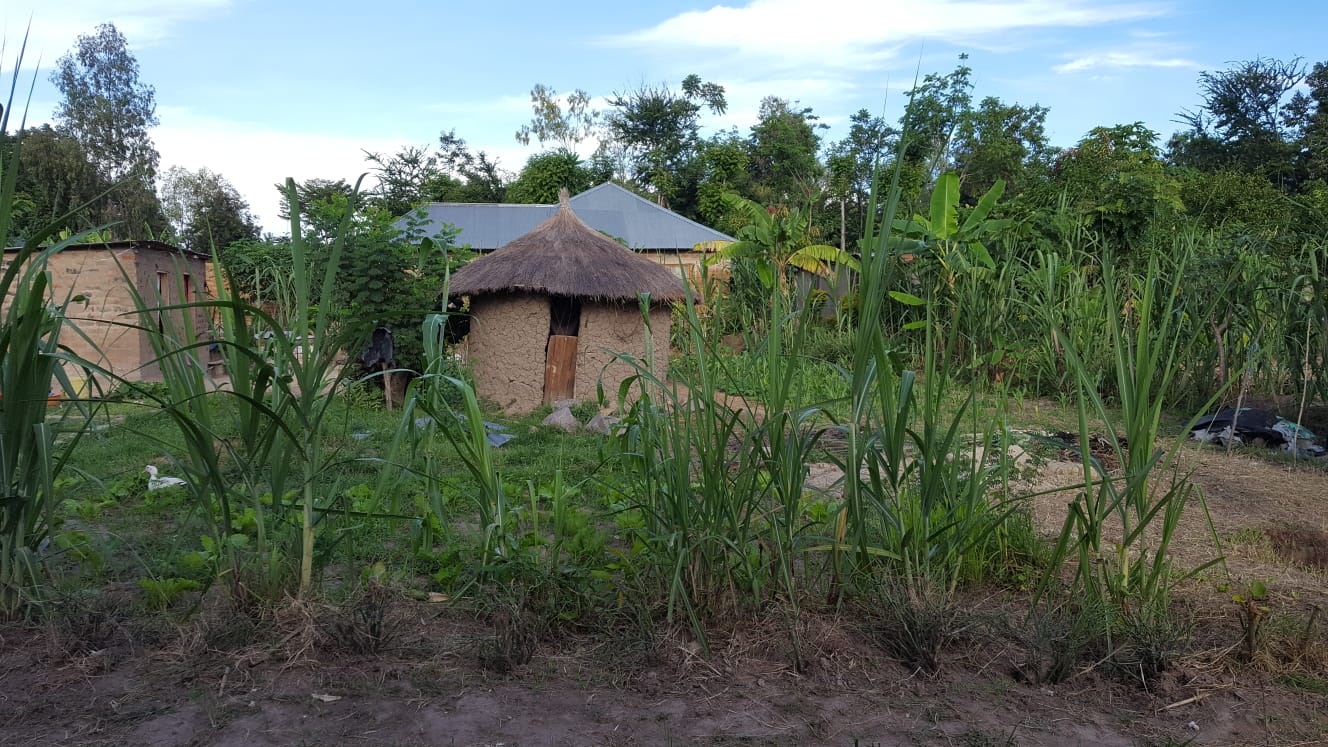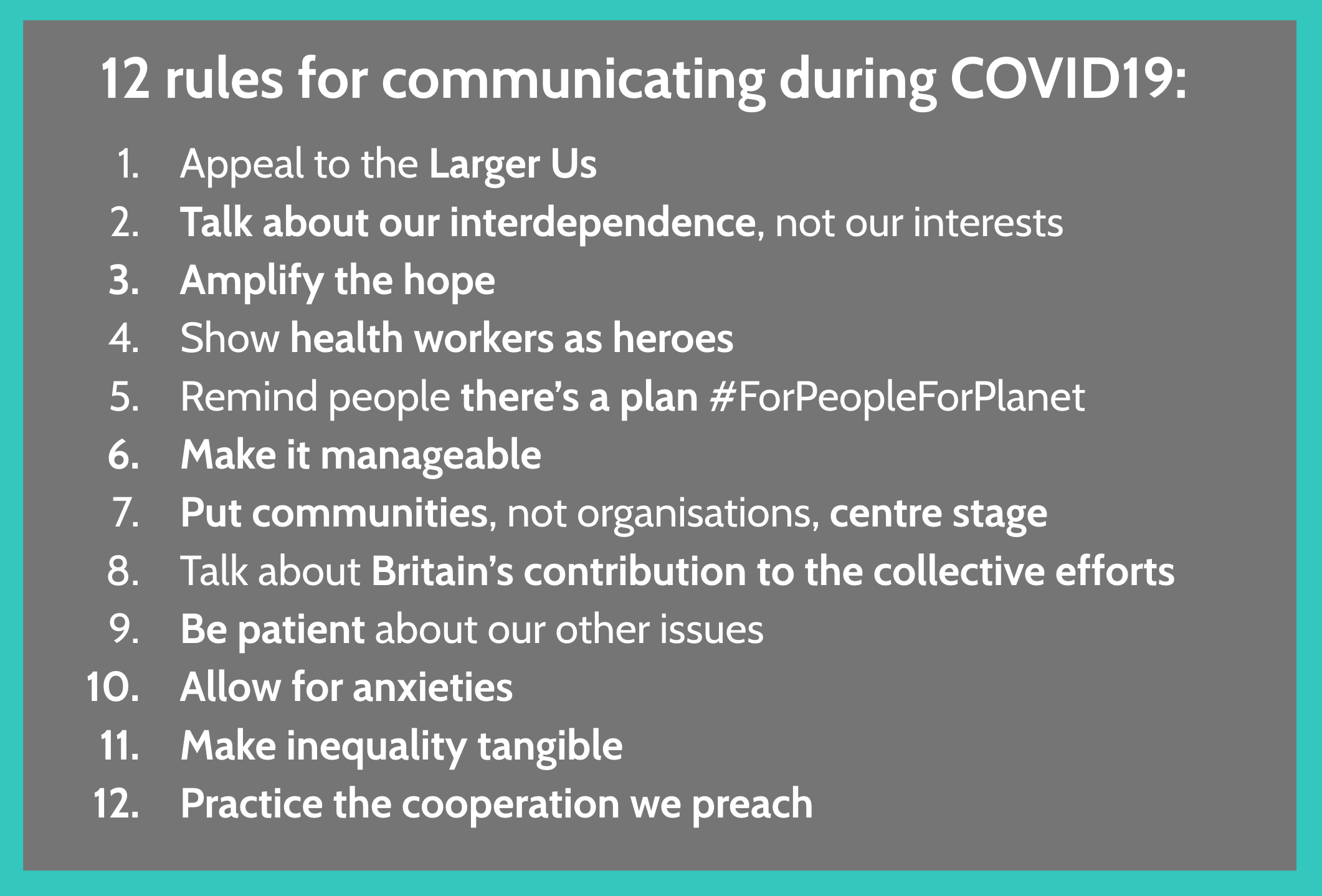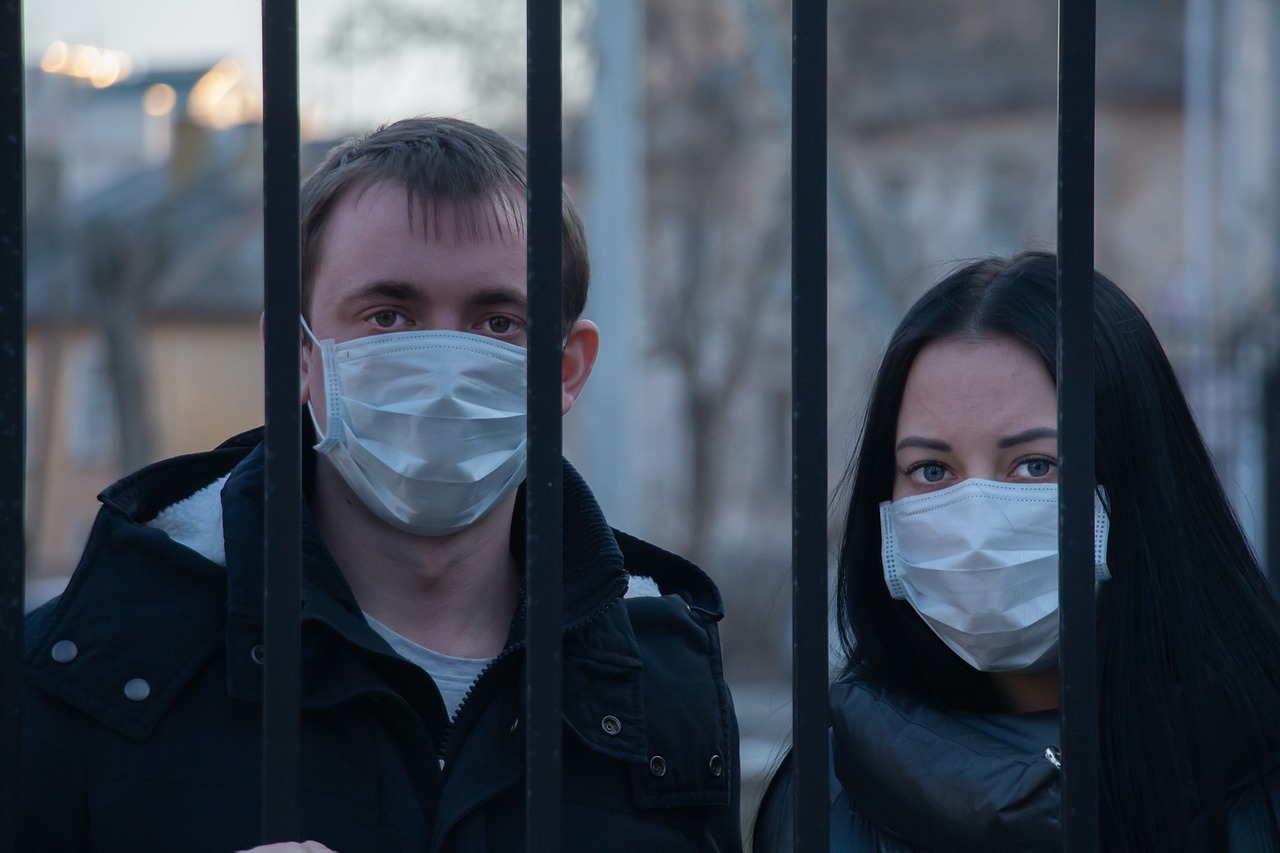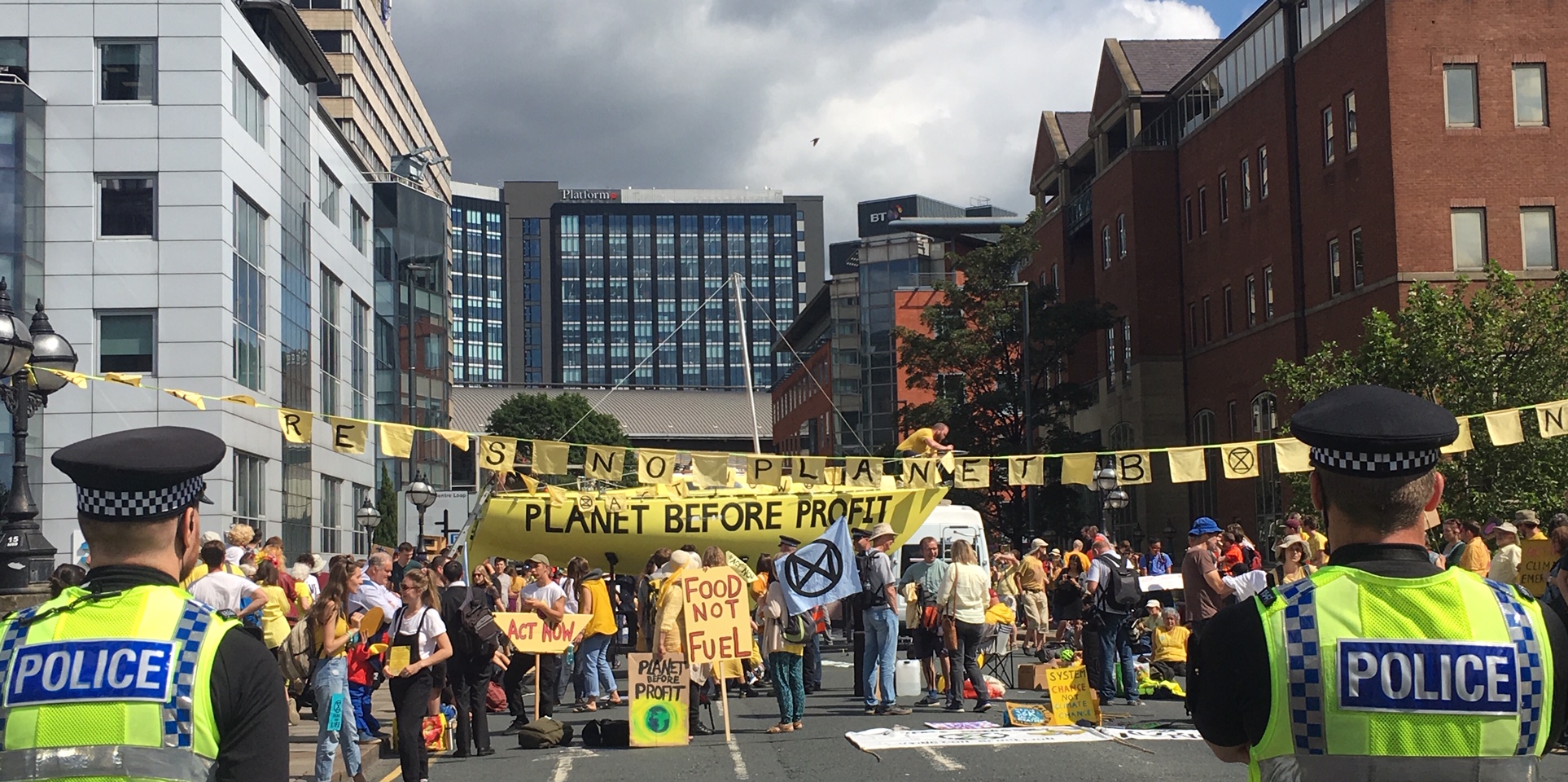Over the course of Freedom and Justice Week, our authors have provided glimpses into how racism has penetrated their communities, their workplaces, their schools, and their countries. What these articles demonstrate is that, while country contexts may vary, humanity has a problem with racism and bigotry that knows no borders and that is pervasive, toxic, and dehumanising. For people asking “what can I do?” our authors did not disappoint. Across the board, they call for action – from institutions and individuals, and all points in between. This series offers a place to start and a challenge to be honest, ambitious, and practical.
The Privilege in Protesting Police Brutality
The United States is confronted by the culmination of its long history of police brutality and exploitation of Black people. And the stark reality of privilege in this country was also made clear as Black people faced higher infection and mortality rates of COVID-19. It is clear that no matter what crisis Americans face, Black people will suffer trauma at a disproportionate rate. It is now time for privileged individuals to acknowledge the liberties and capital they have is tainted by the trauma of individuals they have never met.
The Western Spring
Over the last few weeks, The Western Spring unmasked how little Black lives matter. In the US, while Black people make up only 13% of the US population, they are three times more likely to be killed by police and make up over a quarter of deaths by COVID-19. As young leaders, we recognise that in order to succeed in our work while living in a country that continues to reinforce systematic racism and white supremacy, we must continue to challenge the institutions upholding racial and ethnic inequalities.
I’m black. I’m a peacebuilder. I want your help.
We’re living in a painful time in America’s story. It sucks. That being said, we also have a once-in-a-generation opportunity to finish the chapter. To write history. To shape the future in a momentous way. To build a world where my now three-year-old son can walk the streets safely and confidently with your son. We can get there.
Crafting a Lasting, Global Legacy for George Floyd
This moment is a fitting one to consolidate a body of work by activists, academics, and other civil society organisations into an international instrument capturing our shared commitment to finally eradicating police brutality everywhere. But are resolutions and debates are an adequate and constructive response to the global outcry? The time and resources of the African Union would be better spent consolidating work into a binding standard against which all states should be monitored and evaluated.
Sea of Change: A New Wave of Activism in Bermuda
While Bermuda does not have the same racialised violence that has sparked widespread protest in the United States, even our idyllic island is not immune to the poison prejudice of racism. We have our own brand of racism – it just looks and feels different. It always has. But now is the moment to right the wrongs and the tides are changing.
Public Service Leadership: lessons from #BlackLivesMatter
Two NHS leaders from different generations, and different points of the institutional hierarchy, reflect on the impact of the Black Lives Matter resurgence within the NHS and offer three reflections for public service leaders.
Realising the True Potential of International Schools
As women of colour, we have seen racism manifest itself in our personal and professional lives. As products of international schools, we have also benefited from the tremendous privilege of being educated in world-class institutions and being exposed to many cultures, religions, and ethnicities from an early age. While there are many examples of the good work and progress that have been made by international schools to address racism, there are many others that continue to shelter an environment of racial inequity. The protests around the world provide a moment of reckoning and a teachable moment and we ask that the systems that govern international schools do better.
We Still Have a Dream
Where I work, the stories of past traumas from racist experiences have come pouring out from both staff and young people. And as I heard their experiences, my initial anger turned into an overwhelming feeling of helplessness. But this sense of heaviness also began to change, as I understood the opportunity for people to speak their truth. And that Dr King’s dream of equality can still be realised in the generations to come.
The Freedom to Change – great power requires greater responsibility
Global society is in a moment that history books will recount well into the future. We have entered an era that was foreseen, but also emerged with the intensity of a slap to the face. The time for serious change has arrived. People invented the systems and the rules that we live under, and people have the power to change them.
Justice in a Global Emergency
A cry for justice is echoing around the world. In the US millions of people are marching to demand changes to the failures of the American justice system. In Mali, crowds gathered to demand change to a justice system that is considered corrupt. The cry for an independent judiciary was loud on the streets of Beirut last weekend. And the demand for justice will continue to grow. But there is a better way. Here are our recommended next steps.
Shades of Black
In Turkey, those who had these opportunities because they were born in the ‘right’ part of the country feel superior to the others and discriminate against those who didn’t have the same luck. We need visionary leadership that tackles intra-race racism as well as the hatred that festers between races, so that we are no longer defined by the colour of our skin.
A World in Which Many Worlds Fit
In our dreams for a post-COVID world, what should we demand of our international relations and international public good institutions? What does it mean to de-colonise and transform development and humanitarian enterprise so that it is anti-racist within and without? We want to offer some thoughts.
Making Allies and Burning Bridges
The killing of George Floyd became a problem for all of us. What would it take for this no longer to be seen as a US problem, a black problem, a ghetto problem, a problem for the poor? There is something different happening this time. The protests around the world and the interconnectedness of the young gives this moment an urgency.
Freedom and Justice Week – “tell me how we change”
Welcome to our Freedom and Justice Week series, in response to the wave of protest that was triggered by the murder of George Floyd. Our aim is to provide a platform for a diversity of voices to explore how we respond to the protests.
Scenarios Week Round-Up
Last month, we launch the #LongCrisisScenarios in partnership with the Local Trust. The four scenarios describe COVID-19 futures where the response is polarised or where collective action predominates, and where decision-making is centralised or distributed. For the past week, we’ve been inviting contributors to share their perspectives on a what COVID-19 future might look like. From education to cities, from citizenship to future foreign secretaries, you’ll find all the articles here.
An Independent Panel on COVID-19, Science, Uncertainty and Policy
There is a communications challenge around COVID-19. Messages about what we know, and what we should do, are not clearly shared and reproduced. We propose that WHO should immediately set up an Independent Panel on COVID-19, Uncertainty, Science and Policy (CUSP – everything needs a good acronym), and its main job would be to talk to publics.
How COVID-19 may be as significant as 9/11 for global migration policy
This time last year, we were living in a different world. Now over 400,000 people have died of COVID-19 and we are staring down the barrel at the deepest recession since the Second World War, with the many challenges that lockdowns have surfaced: unemployment, domestic violence, racial and economic divides, inequalities in access to health and education, and poor international co-operation.
Towards More Equal and Resilient Cities Post-COVID-19
What path we take post-COVID-19 will depend in large part on how the world’s cities change. The Long Crisis scenarios are a timely and helpful reminder that nothing is settled: our future is up for grabs. A better future can only be won by equipping and empowering cities to drive a green, inclusive recovery post-COVID-19.
The Fall of the Big Men
We have known for generations that our old models of leadership are not fit for purpose. A once in a multi-generation pandemic offers a global leadership control experiment and we’ve seen what we like, and what we don’t. The winners are rising to the top – the losers are showing the limitations of their Big Men style.
After COVID, Where Will We Be?
Yesterday afternoon, representatives from the Long Crisis Network, Local Trust, and The Alternative UK came together to explore the implications of the Long Crisis Scenarios for the future of communities.
The Long Crisis Scenarios are a Call to Citizen Thinking
The Long Crisis Scenarios are a tremendous gift to us all. Considered and calm, they offer a way to make sense of events that can otherwise seem so great in magnitude that, for myself at least, there is a real risk of feeling completely overwhelmed. But more than that, in the form of the Winning Ugly scenario, in particular, they offer both a call to action and a reassurance that action can and will be meaningful.
2030: Which Path Will We Take?
Scenarios for our post-COVID future kept coming up in discussions over at the Red Button Club. So we teleported ourselves into the year 2030 and took a seat at the desk of a recently retired foreign secretary, getting ready to pour his/her heart into an honest end of the year op-ed.
Winning Ugly: Five Lessons From Managing a School Shutdown
On 28 February, Lebanon confirmed its fourth case of COVID-19, closing all schools with immediate effect on the same day. Fadi Yarak, the Director General of Education in the Lebanese Ministry of Education and Higher Education (MEHE), shares some lessons from over a decade of leading a school system through difficult times.
Four Scenarios and a Future for Communities
To think through the changes we need to make, it makes sense first to try to understand the new landscape, even as it is still unfolding. To help answer that question, we asked Alex Evans and David Steven, founders of the Long Crisis Network, to develop some scenarios, each describing a different future that could emerge from the events happening around us now.
Scenarios Week on Global Dashboard
Today, we’re kicking off Scenarios Week, a week of articles from leading thinkers who have formed their own responses to the Long Crisis Scenarios, perspectives on what our world might soon look like, or insights on how we can prepare for an uncertain future.
Putting the Most Marginalised at the Centre: Lessons for the COVID-19 Response from the HIV Epidemic
You can’t fight epidemics or improve public health by just telling people what to do and disregarding all the factors that affect our day-to-day decisions or force us to do things we wouldn’t otherwise do. You also can’t improve the health of a nation if you ignore people who are already sidelined.
Our COVID Future: The Long Crisis Scenarios
COVID-19 marks a turning point in the 21st century.? Levels of uncertainty are off the chart, making predictions impossible. ?But if we can create plausible stories about different futures, we create a foundation for decision makers, campaigners, and communities to influence the process of change.?
Protecting our Critical Global Infrastructure
In the final section of our Shooting the Rapids report, we present a plan for collective action with four elements. In this post, we’re focusing on one in particular: protecting critical global infrastructure.
Shooting the Rapids: COVID-19 and the Long Crisis of Globalisation
Shooting the Rapids: COVID-19 and the Long Crisis of Globalisation is a major new report that explores what we do and don’t know about each of the three layers of the COVID-19 crisis, sets out a playbook for collective action, and presents a plan for international co-operation.
Justice Leadership in a Pandemic: Read the Call to Action in Four Languages
Last month, we released a call to action by members of the Justice Leadership Group – a call for justice leaders to step up, work collaboratively, and put people-centred justice at the heart of their response to the COVID-19 crisis. Now, we’re pleased to announce that the original English article is also available to read in Arabic, French, and Spanish.
The Debts We Now Owe Each Other – and How to Pay Them Back
In Our Other National Debt, we have tried to make practical proposals for how to start turning gratitude or warm sentiment into real-world action that will make a meaningful difference. Nothing about this is easy, but it’s nonetheless profoundly important. How can we encourage good things to flourish even in rough and damaged soil?
Long-Term Solutions to Food Crises: Building Credit Institutions That Can Finance Agriculture Value Chains
The World Food Programme has predicted that the coronavirus pandemic will double the number of people facing crisis levels of hunger. “We could be facing multiple famines of biblical proportions,” according to its executive director, if we don’t act to avert them.
The True Cost of COVID-19 School Closures
According to our model, just four months of school and university closures across the United States could result in a $2.5 trillion total loss in future earnings. At a global level, these new data suggest that the current generation of students could lose up to $10 trillion as a result of COVID-19 closures over the course of their careers.
This Too Shall Pass: Mourning Collective Loss in the Age of COVID-19
The nature of this crisis goes right to the core of how we live – and die – as social beings, and forces us to look our unease with death squarely in the face. We are experiencing widespread loss, and this inevitably leads to the need to grieve. As such, we recognise that grieving well and collectively will be essential.
Foxes vs Hedgehogs: The Importance of ‘Followership’ in the Age of COVID-19
In recent weeks, the wider internet has felt awash with people who are certain of their expertise in epidemiology, despite weeks earlier being experts in something only tangentially related. When basic errors are pointed out to them, they double down. Admitting you were wrong or simply don’t know is not something humans are very good at doing or rewarding.
#BuildaBridgetoBetter: Recommendations to Drive Pandemic Responses
Disasters have a way of focusing the mind, focusing our energies, and harnessing attention. The unfolding disaster that is the coronavirus pandemic is no different: the world is united in our focus on this singular enemy. What is different is that this pandemic is not a one-off event; this is not a storm that we will easily ‘ride out’. There is no clear blue sky on the horizon.
High Five: Building Back Better Children’s Services
We have previously highlighted the enormous sacrifice the world’s children are being asked to make to help protect the most vulnerable from COVID-19. Now, we’re outlining five actions we should start working on today to ensure children’s services are back up and running as soon as possible, and that they return strengthened and improved.
A Call to Action from Former Ministers, Attorneys-General, and Senior Judges
Ministers of justice are on the frontline of the response to the COVID-19 pandemic. But unlike health ministers, they do not have the same opportunities to work together across borders. That needs to change.
Justice Leadership in a Pandemic
Ministers of justice are on the frontline of the COVID-19 response. But unlike health ministers, they do not have the same opportunities to work together. That needs to change.
Resources for Tackling the Mental Health Impacts of COVID-19
Before the spread of the coronavirus, almost 600 million people worldwide were estimated to be suffering from anxiety or depression. Suicide took the lives of 800,000 people a year, and was the second leading cause of death among those aged 15–29. These figures are now likely to rise.
Wrapping Up Local Week
The initial call for collective action has taken on new life during our Local Week series. Throughout the week, we’ve shared insights from leading thinkers on public health, policy, community empowerment, local politics, urban planning, and more, each exploring the effects of the unfolding coronavirus pandemic at a local level – you’ll find them all here.
After the Virus: Ensuring No Community and No-One Is Left Behind
COVID-19 has underlined both the challenges faced in Cambridge and the strengths within the community we serve as a council. As a group we are now thinking through what our strategy needs to be over the coming months as we regroup and rebuild.
Unnoticed, people are dying on the home front
People are infected with and dying from COVID-19 in three settings. In hospitals. In residential care facilities and other non-medical institutions such as prisons. And at home.
Respond and Renew: the Work of Local Trust
Where you live and who your neighbours are have never mattered more. With nowhere else to go, immersed in a protracted global emergency, we recognise that the places where we live will shape our fortunes.
Learning From the Lockdown to Build Back Better
Learning from how people are coping in lockdown will help us make the right decisions about retrofitting existing places or designing new ones.
Typologies of Change
As we begin to look forward to the world that emerges out of this crisis, there are three types of changes to consider. Each will need to be approached in a different way, using different tools and techniques.
The Next Wave: COVID-19’s Hunger Crisis
There’s a lot of wartime imagery and metaphor around. The battle against COVID-19. The war against the pandemic. The fight of our lifetimes. But we’ve got the metaphor wrong.
Enlisting Community Leaders to Overcome COVID-19 in Africa
A response led by the community and supported by outsiders is likely to be the most effective means of controlling COVID-19 in slums.
Things We Now Have and Don’t Want to Lose
While the rapid changes we have seen in recent weeks have arisen from urgent necessity, and many carry very heavy costs, it is also true that some of these changes are profoundly positive.
Four Pathways to Better Decisions
How do you make good decisions when you’re playing whack-a-mole? Here are four recommendations for governments to improve their decision-making.
From Peril to Promise: Our Debt to Children
In the long run, the world must commit to paying back the debt to children that is mounting up during this global emergency, just as it did after World War II.
The Virus of Misinformation: How Not to Use Technology in a Pandemic
Please: don’t hold a hackathon. Don’t put a map online showing where people are who need help or offer help. Don’t share people’s data without their consent and understanding.
Justice for All and the Public Health Emergency
Justice systems are vital to responding to the COVID-19 pandemic and mitigating its worst effects, but they will need to overcome many challenges if they are to operate effectively.
The Virus and the Global Goals: What Could COVID-19 Mean for Sustainable Development?
This virus has demonstrated just how much we are of one planet, and that concept—that we are all global citizens—is the bedrock of the SDGs.
New Ideas to Tackle Coronavirus – Global Dashboard takes up the Challenge
Big challenges demand big ideas, and at Global Dashboard we’re ramping up our content in response to the COVID-19 pandemic.
Ideas for Tackling COVID-19 in the Short-Term
Already, our contributors to the newly relaunched Global Dashboard are churning out new ideas for tackling the coronavirus pandemic in the short-term.
Fragility and Pandemics: Finding the right equation to steer action
Rather than looking categorically at fragile states, we should consider overlaying fragility with indicators of inequality, authoritarianism, what Rachel Kleinfeld has termed “privilege violence”, and demographic data.
Feed the World
There is not enough attention being paid to the basic questions: what can the world do to ensure that we don’t miss planting season and spread a global food crisis on top of COVID-19?
COVID-19 Immunisation: Preparing for the Perfect Handoff
Every leg in this race is important, but it is typically the first that attracts the lion’s share of attention and resources.
More on the Coronavirus and Slums
“The answers are going to come from within communities themselves. The community is the first line of defence, but governments can’t just wash their hands of this.”
COVID-19 and the Intergenerational Covenant
Until a month ago, a deep generational divide was the new front line in our polarised politics. But COVID19 could be about to change that – if we get this moment right.
This is a Love Story: thinking globally during COVID-19
This is a love story. Forget what you’ve heard. It isn’t a war, it isn’t a fight. It isn’t a race, it isn’t a competition. This is a love story.
How to Tackle Coronavirus in Slums
Western governments, following the example of China, have adopted broadly similar approaches to tackling the COVID-19 pandemic. After initial hesitation, and...
Peace and Pandemics: How COVID-19 will impact violence and what we can do about it
As the world prepares for and responds to the direct health impacts of the COVID-19 coronavirus, those of us who work on reducing violence and preventing...
You’re Not Being Bold Enough
You're not being bold enough. I don't mean that you should be going out. Stay at home, covidiots! I'm writing this from home in Italy - and just as it is said...
The Collective Psychology of Coronavirus
Just like climate change or political tribalism, coronavirus asks us: do we see ourselves as part of a Larger Us, a them-and-us, or an atomised "I"? Each of...
Communications in the age of digital elections
Recent elections in the US and the UK have yielded more questions than answers about what works and what doesn’t when it comes to messages and tactics...
Too many powerful forces are driving division – here are the seven trends you need to know about if you want to democratise and depolarise our common life instead
Lawyers, historians and constitutional experts will ultimately have the final say about whether last week’s decision to prorogue parliament is a democratic...
10 thoughts from an Extinction Rebellion newbie
Two weeks ago, I went to my first Extinction Rebellion meeting in Leeds, curious to find out more about it ahead of its national actions in five UK cities...
“We ask to be moved so our children live. We ourselves are already dead” – the power of solidarity with a mother’s struggle against a mining corporation.
You can taste the pollution at Kankoyo. Not just smell it, you can taste the air. Welcome to Kankoyo, Zambia, welcome to the Mopani Mufulira mine that has...
Public interest in the SDGs
I got curious about what’s happened to global interest in the SDGs since they were agreed in 2015, so I ran a Google Trends analysis on it. Top line: turns...
What do we need to do to win the fight against inequality? An activist-researcher seeks your advice.
As activists we sometimes talk as if we know the answers. As researchers we get to admit that we don't (until publication, of course :-)). As both an...
What kinds of personal transformation help to drive system transformation?
What kinds of personal transformation help to drive whole system transformation? That was just one of the questions explored at a fascinating event hosted by...
Myths for an age of political polarisation
Want to change the world? Then what you need most isn’t facts; it’s a really great story. So I argued in a book called The Myth Gap (summary here), which came...
Pathfinders for Peaceful, Just and Inclusive Societies – new website
The new Pathfinders for Peaceful, Just and Inclusive Societies website, for all things SDG16+

